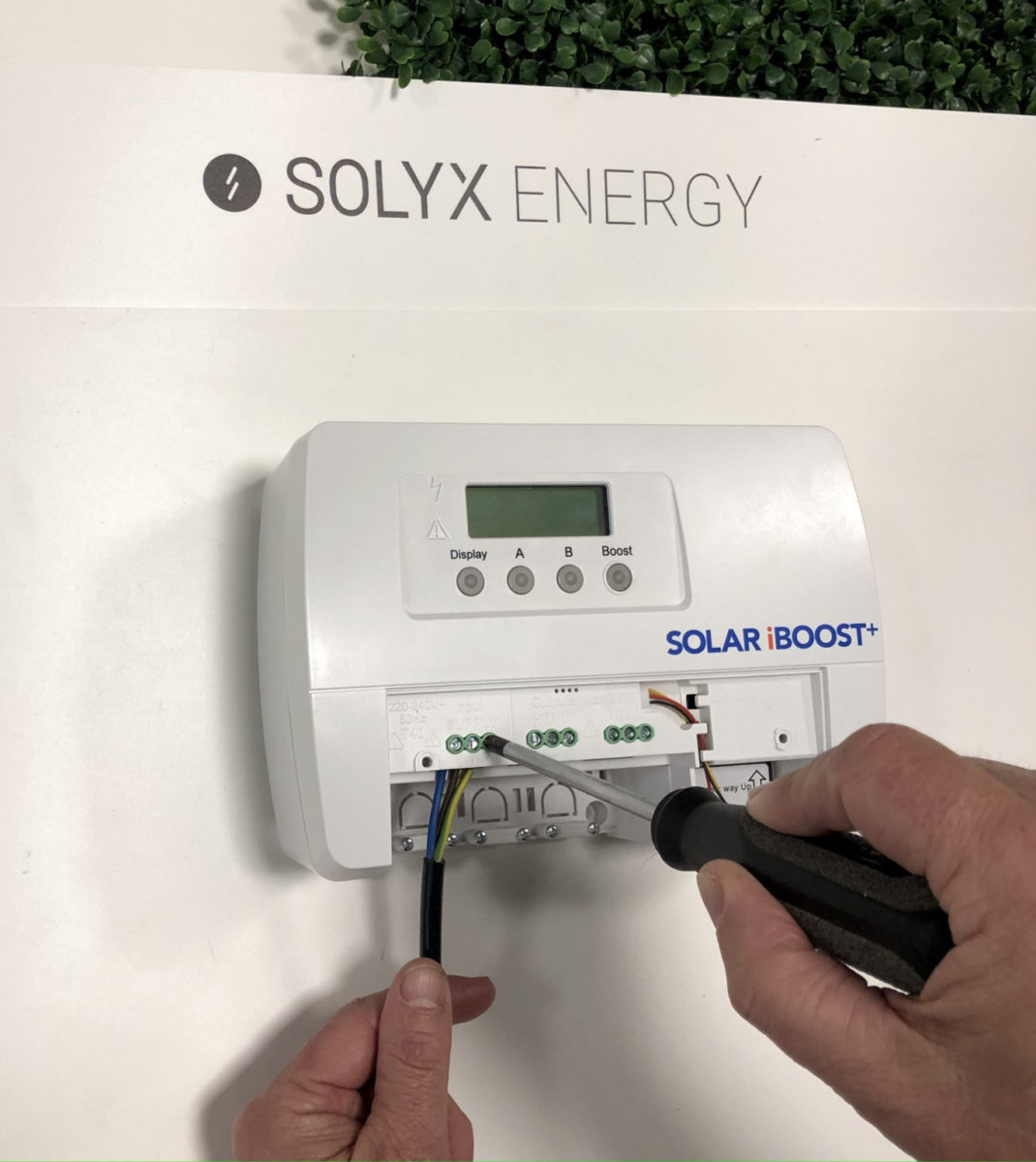From pv magazine Global
Dutch solar startup Solyx Energy has developed a system to maximize residential PV self-consumption.
“The concept is to store excess solar power for households in form of warm water,” Solyx Energy co-founder Emma Snaak told pv magazine, noting that the technology can be paired with PV modules and water heaters of any brand and capacity, but most effectively with single-phase inverters.
The solution consists of two components. A sensor with a measuring clamp attaches to the household’s grid connection – usually an electricity meter – and the Solar iBoost controller. The clamp attaches to the power line one wants to measure. It detects the direction the electricity is flowing in, and continually measures the amount of excess PV power that is sent to the grid. The sensor, powered by two AA batteries, then communicates that value to the Solar iBoost, wirelessly via radio waves with an indoor range of 1 meter to 30 meters.
“The sensor measures the net exported solar power. That is essential to understanding how the solution works. It is not just taking into account how much solar is being generated, but it also takes into account the consumption of the house,” explained Snaak.
The Solar iBoost is connected to an electric water heater. It has a voltage range of 220 V to 240 V, a maximum load of 3 kW, and weighs 1.36 kg. The controller regulates the amount of energy fed into the water heater to the exact value measured by the sensor. This way, no export of solar power onto the grid takes place.
Solyx has partnered with UK-based Marlec, the manufacturer of the Solar iBoost. “This product is the second version [of the Solar iBoost], the first version has been on the market longer. Solyx has been providing Marlec with inputs and requirements for fitting the product to the EU,” said Snaak .
“Water tanks are usually switched on or off,” she continued. The Solar iBoost modulates the energy fed into the water heater to match varying solar production and household electricity consumption. The purported advantage is that water can start being heated with as little as 100 W of power, in comparison with the usual 2 kW to 3 kW, according to Snaak.
“The water is heated only with the excess PV power, which varies throughout the day,” she said. “If there is less sun, or you are using your vacuum cleaner, it will heat a little less. If there’s a lot of sun or appliances aren’t in use, it will heat a lot more.”
The device maximizes solar self-consumption and, at €595 ($638) including value-added tax (VAT), it is a cheaper alternative to most batteries or heat pumps. Solyx Energy predicts average savings of €338 a year for Dutch households. The solution can be used alongside energy storage and heat pumps for home heating, but not with heat pump boilers. Snaak argues the Solar iBoost is a better match with solar PV than heat pumps.
“Heat pumps are very efficient when constantly on and delivering a little bit of heat the entire day. If you just have excess power right now and you want to use it, heat pumps aren’t very efficient,” she claimed. “With the electric heater and the Solar iBoost, you can switch on when you have peaks in your solar, or turn it off when you have loads. That balancing act you can do throughout the day is I think really interesting with emerging trends like flexible energy tariffs.”
The product currently does not offer the option to switch on or off according to the most profitable tariff, but it has the potential to do so in the future. Solyx currently only offers the product in the Netherlands and Belgium, but it says it will consider expanding to the rest of Europe and other world markets after consolidating its presence in the two countries.
*This article was updated on 8/02/2023 to add Solyx’s claim about its partnership with Marlec, the Solar iBoost manufacturer.
This content is protected by copyright and may not be reused. If you want to cooperate with us and would like to reuse some of our content, please contact: editors@pv-magazine.com.








By submitting this form you agree to pv magazine using your data for the purposes of publishing your comment.
Your personal data will only be disclosed or otherwise transmitted to third parties for the purposes of spam filtering or if this is necessary for technical maintenance of the website. Any other transfer to third parties will not take place unless this is justified on the basis of applicable data protection regulations or if pv magazine is legally obliged to do so.
You may revoke this consent at any time with effect for the future, in which case your personal data will be deleted immediately. Otherwise, your data will be deleted if pv magazine has processed your request or the purpose of data storage is fulfilled.
Further information on data privacy can be found in our Data Protection Policy.